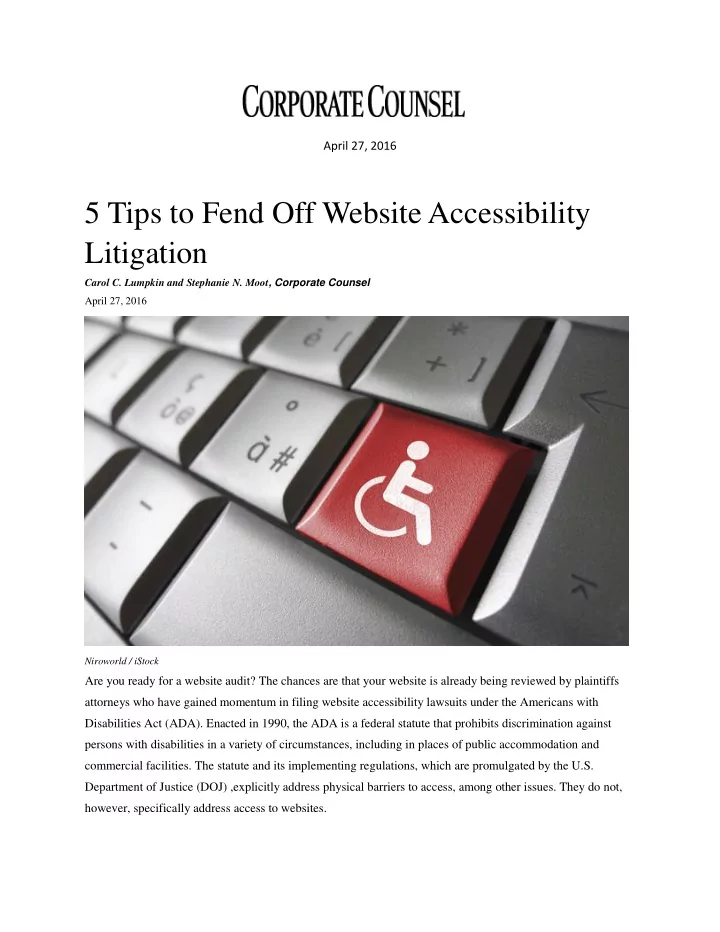

April 27, 2016 5 Tips to Fend Off Website Accessibility Litigation Carol C. Lumpkin and Stephanie N. Moot , Corporate Counsel April 27, 2016 Niroworld / iStock Are you ready for a website audit? The chances are that your website is already being reviewed by plaintiffs attorneys who have gained momentum in filing website accessibility lawsuits under the Americans with Disabilities Act (ADA). Enacted in 1990, the ADA is a federal statute that prohibits discrimination against persons with disabilities in a variety of circumstances, including in places of public accommodation and commercial facilities. The statute and its implementing regulations, which are promulgated by the U.S. Department of Justice (DOJ) ,explicitly address physical barriers to access, among other issues. They do not, however, specifically address access to websites.
This is not surprising given that the Internet, in its current incarnation, did not exist when the ADA was enacted over 25 years ago. With the evolution of the Internet, DOJ has been working on developing enforceable website accessibility regulations. The Justice Department has indicated that it is considering modeling its anticipated regulations after either the Section 508 Standards, which govern websites operated by federal government agencies, or what are known as the Web Content Accessibility Guidelines (WCAG) 2.0, which were created by the World Wide Web Consortium. Although the department has been considering the issue for years, it has not yet finalized the regulations. Despite the absence of enforceable website accessibility regulations, plaintiffs lawyers have been sending demand letters to and filing lawsuits against small businesses and big corporations alike,. Dozens of such lawsuits have been filed throughout the country, and across industries, since the last half of 2015. They claim that the general provisions and purpose of the ADA extend to website accessibility and point to the Section 508 Standards and WCAG 2.0 as alternative benchmarks for compliance. Their positions are also sometimes bolstered by “Statements of Interest” filed by DOJ. Faced with the prospect of high lit igation costs, unflattering publicity and an uncertain outcome, many of the targeted companies have determined that the cost-benefit analysis points to settlement. There are at least two cases pending in the District Court of Massachusetts, however, that could prove instructive. Class-action plaintiffs have sued two educational institutions for violations of Title III of the ADA and Section 504 of the Rehabilitation Act of 1973 because not all of their online courses available to the public are captioned. Among other arguments, the educational institutions moved to dismiss or stay the cases under the doctrine of primary jurisdiction, given that the Justice Department was developing enforceable website regulations, which at the time were anticipated in 2016. In response and in each case, the department filed statements of interest arguing that the ADA’s general provisions require website accessibility, and that the lawsuits should not be stayed pending the uncertain timing of its adoption of enforceable regulations. Justice subsequently announced that its final website accessibility regulations are not expected to be passed until 2018. In a recent setback to the educational institutions, the presiding magistrate judge issued a 45-page opinion denying both motions to dismiss or stay. The judge rejected the arguments for a dismissal or stay while the DOJ continued its development of website accessibility standards. The judge found that the doctrine of primary jurisdiction did not apply because the court did not ne ed the department’s expertise to determine which accommodations are required by the ADA, and when a requested accommodation constitutes an undue burden for a particular defendant. The judge also gave deference to the department’s interpretation that the ADA applies to the Internet and web-based goods and services.
The educational institutions have filed objections to the magistrate judge’s report and recommendation, which will be considered by the presiding district judge. Even if adopted, the ruling does not amount to a determination that the educational institutions have violated the ADA, or that they are required to caption all videos on their websites. Rather, it would allow the cases to proceed to the discovery phase. In the meantime, businesses need to know what they can do to prevent threatened website accessibility litigation, and to defend against such a lawsuit should they be targeted. Here are five tips to get you started: 1. Implement features in your website that enhance accessibility to persons with disabilities. For example, consider font size, text and background contrast, compatibility with screen reader software, text alternatives for images, etc. 2. Additionally, consider website accessibility early on in the design phase. It is typically more cost-effective to include accessibility features at the outset than it is to add them during a redesign. 3. Work with counsel to develop defenses to ADA litigation. While the ADA allows for recovery of attorney’s fees, there are ways to thwart the prospect of plaintiff’s attorney’s fees by showing that the lawsuit was not the “catalyst” to ADA enhancements. 4. Confer with counsel about going on offense when your business is faced with threatened litigation. For example, retain a technologist. 5. Consider contractual provisions in website vendor contracts that could provide protection to your business and minimize your potential exposure. With the right resources and planning, businesses can put themselves in a better position both to deter website accessibility lawsuits and to defend against them.
Recommend
More recommend